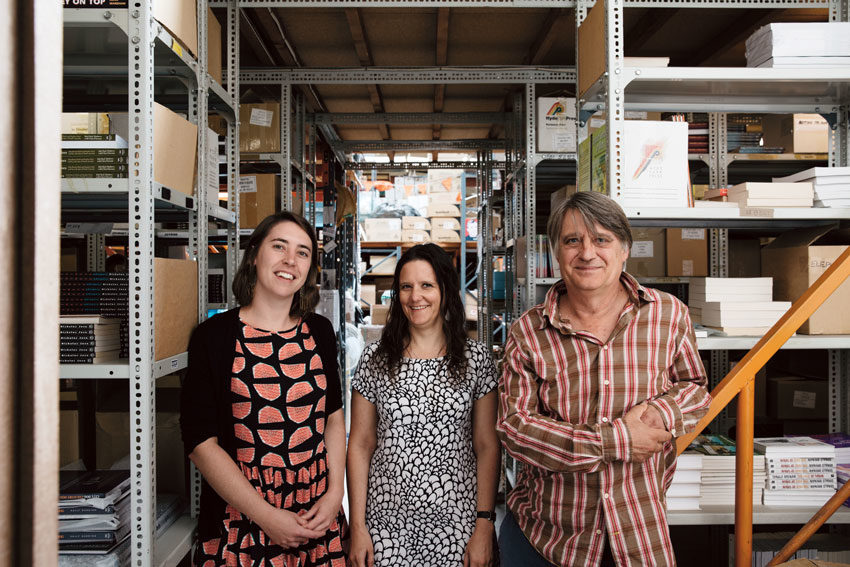Wakefield Press turns the page on 30 years

Thirty years ago Michael Bollen acquired a publishing company that was little more than a second-hand computer and a historic name. Since then Wakefield Press has built a community, publishing local stories that resonate far beyond South Australia.
“There was a Wakefield Press in Adelaide established during the war, run by a bookseller named Harry Muir who ran a shop called the Beck Book Company in Pulteney Street,” Bollen tells The Adelaide Review.
The name was later revived in the 1980s by the state government to publish a line of South Australian history books in the lead up to the state’s sesquicentenary, and eventually passed into private hands with The Adelaide Review’s former proprietor Christopher Pearson. Enter the young Bollen, who had worked for Pearson in proofreading and sales.
“I was approaching 30 and I thought, ‘Crikey, what am I going to do with my life?’” he recalls. Once Pearson and other shareholders had lost interest in the company, Bollen took a punt, setting up Wakefield Press’ fifth incarnation in 1989. “I took over and somehow acquired a place to live and run an office in Wakefield Street, Kent Town, which was serendipitous.”

Bollen’s quarter-life crisis turned into a 30-year vocation, with early successes such as Lydia Laube’s Behind the Veil and Sir Douglas Mawson’s Antarctic adventure memoir The Home of the Blizzard laying the foundation for the 35 titles Wakefield Press now publishes annually. And while the company routinely prints authors and stories from outside the state, its substantial local output is a way of ensuring South Australian stories are being told.
“It’s important because people want to know,” Bollen says. “The interest in South Australian history is quite large, comparatively, [but] for a big publisher the numbers aren’t huge. But it’s important that these stories get told. Stories spread – our biggest customer is Booktopia. People are buying everywhere, and if the stories aren’t told they don’t exist. They’re just not there.”
“And just because a story is South Australian doesn’t mean it won’t have wider interest,” says Margot Lloyd, Wakefield Press editor and now publisher of the company’s new Young Adult list.

“One thing that’s unique about Wakefield in South Australia, is, as a small publisher, we can put more attention on each title,” marketing and publicity director (and author) Jo Case adds. “You have that relationship with authors, where they come into the office, get to know all the staff. That intimate, hands-on relationship, I think, is unique and really valuable. Wakefield has continuously been that place in South Australia.”
The past three decades have brought great change and disruption for the book industry. But while the collapse of chains such as Angus & Robertson have brought challenges, the arrival of ebooks, advances in short-run printing and the advantages of handling their own distribution (“We’ve seen so many third-party distributors go under,” Bollen says) have seen Wakefield Press emerge in good shape as a nimble and resilient 21st century publishing house.
“We keep changing,” Bollen says. “It’s interesting that people say we are known for strengths in South Australian history, history generally and biography, because we are actually quite eclectic.”
“We can do weird things that other companies can’t do,” Lloyd says. “Especially the bigger companies where a lot of decisions are controlled by marketing people – I especially see that in YA. Whereas we can say, ‘That’s a really weird idea, let’s try it!’, which can work in our favour… and then can sometimes backfire,” she laughs.

Lloyd’s latest gambit in boosting Wakefield’s Young Adult offerings has already begun to pay off, as the recent launch of its newest title, Making Friends with Alice Dyson by Adelaide-based first-time author Poppy Nwosu, drew an audience quite unlike the typical Wakefield Press event.
“We’ve tapped into this thing we didn’t realise we had,” she says. “It’s so nice to be able to say we’re doing something for young people, because we do so much history publishing at Wakefield it’s often joked that there’s a much older clientele. But suddenly last night at this launch we saw all these really excited pink-haired young people, eating pink cupcakes and having photos taken.”
And among those excitable young readers, there’s an evident delight found in reading a book recognisably set in their hometown (“Guys believe me when I say NOTHING is set in this city,” one enthusiastic online Goodreads review proclaims).
“There’s something really important about seeing your own stories,” Lloyd says.
Header image:
Margot Lloyd, Jo Case and Michael Bollen, photo: Sia Duff